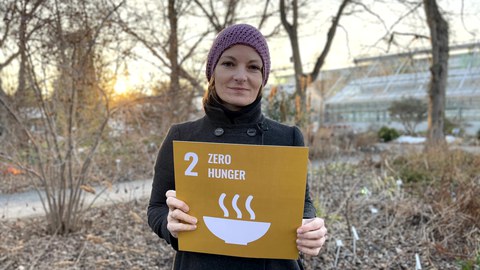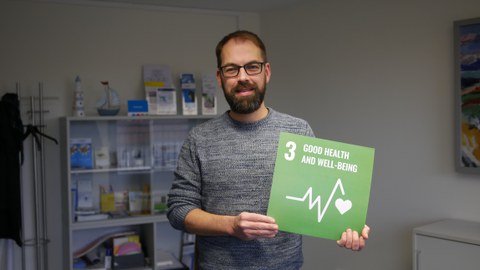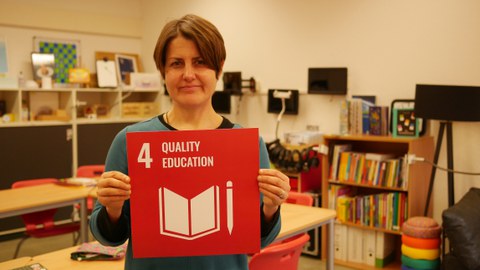People
Table of contents
- SDG 1 "No poverty" - Engineers Without Borders
- SDG 2 "Zero hunger" - Junior Professorship in Nutrition and Home Economics
- SDG 3 "Good health and well-being" - Health Management
- SDG 4 "Quality education" - Center of teacher education and educational research
- SDG 5 "Gender equality" - FrauenUmweltNetzwerk* (FUN*)
- SDG 6 "Clean water and sanitation" - Center of Advanced Water Research (CAWR)
- SDG 10 "Reduced inequalities" - Diversity Management
SDG 1 "No poverty" - Engineers Without Borders
Mirko Köhler is part of Engineers Without Borders and an advocate of SDG 1:
What is the project about and how does it relate to SDG 1?
We are a non-profit organization with a focus on development cooperation. We work with people where technical collaboration is needed and possible, especially by providing basic infrastructure. The Dresden-based group is currently working with the Mbuyuni Women Group in Kenya to expand the Mbuyuni Sunrise Academy education center. This will provide the locals with a solid education in order to ensure their independence in the long term. Engineers Without borders has wholeheartedly committed itself to the Sustainable Development Goals. The project of the Dresden-based group is particularly dedicated to SDG 1 “no poverty.” Not only will well-educated people have faster access to employment, they will also be able to create new earning opportunities in the region. The volunteers of the group in Dresden are striving to achieve this goal through equitable cooperation with the dedicated local women’s group. If you would like to actively support them, let us know by sending a message to . Everyone is welcome to participate, regardless of nationality or academic qualifications!
What word would you use to describe this project that focuses on SDG 1?
Cooperation
SDG 2 "Zero hunger" - Junior Professorship in Nutrition and Home Economics
Jana Markert, Junior Professor of Nutrition and Home Economics and Vocational Didactics, is an active proponent of SDG 2, “Zero Hunger”:
What is the project about and how does it relate to SDG 2?
The educational farmland in the Botanical Garden is a special place for teaching and learning. A project seminar on education for sustainable development (BNE) takes place here and is particularly aimed at student teachers. This is a prime example of how our teaching and research effectively addresses SDG 2 “Zero Hunger.”
We shed light on the current (global) food system in terms of socio-ecological sustainability: How sustainable is our food production? What are the consequences for other parts of the world - ecologically and socially? What impact does this have on individual’s health here and in other parts of the world? What role do large food corporations and local (rural) economic structures play in this? How much food would we need to feed 10 billion people in 2050?
Fundamentally, the problem is not that we cannot produce enough food. We need to be able to produce it sustainable and ecologically in order to avoid destroying our basis for life - the basis of all life on Earth - our planet by overusing it. At the same time, we need to distribute the produced food fairly. We have an obvious distribution problem that we urgently need to address in order to finally achieve SDG 2.1: to end hunger and ensure that all people, especially the poor, the vulnerable, including young children, have access to safe, nutritious and sufficient food all year round. The right to an adequate supply of food is a human right. According to article 11 of the UN International Covenant on Economic, Social and Cultural Rights, signed by 162 countries, “recogniz(es) the fundamental right of everyone to be free from hunger.” Yet, we are still far from achieving SDG 2 (by 2030).
What word(s) would you use to describe this project that focuses on SDG2?
Raising awareness
Link to the project educational farmland
SDG 3 "Good health and well-being" - Health Management
Jochen Richter, Psychologist at the Occupational Health Services of TU Dresden, is a proponent of SDG 3:
What is the project about and how does it relate to SDG 3?
In addition to psychological counseling for employees, my work includes counseling on consumer behavior and addiction. We are the first port of call for affected persons: for supervisors, colleagues, and any members of the university that have questions related to this topic.
Our goal is to provide effective preventative measures with regard to substance abuse - e.g.alcohol - but also behavioral addictions, such as media addiction. To achieve this, we organize workshops and training sessions. And of course, we provide counseling whenever and wherever it is needed.
What word would you use to describe this project that focuses on SDG 3?
To describe what we do in one word is pretty much impossible. I would say that “proponents of change” fits pretty well.
SDG 4 "Quality education" - Center of teacher education and educational research
Dr. Rachel Bowden is a research associate at the Center for Teacher Education and Educational Research (ZLSB), and also a proponent of SDG4:
What is the project about and how does it relate to SDG 4?
At the ZLSB, inclusive, high-quality and equitable education is paramount to our work. In tangible terms, we are currently setting up an ERASMUS+ Teacher Academy. This promotes teaching sustainably while working with eleven partners from seven European countries to create learning materials for schools. We are organizing a country-wide initiative to embed Education for Sustainable Development (ESD) in the first phase of teacher education. We also have a sustainability process here at the institute.
SDG 5 "Gender equality" - FrauenUmweltNetzwerk* (FUN*)
Jule Schneider and Renée-Sophie Broy are members of the FrauenUmweltNetzwerk* and advocates of SDG 5:
What is the project about and how does it relate to SDG 5?
We at the FrauenUmweltNetzwerk*, FUN* for short, would like to support promising women scientists in establishing a professional network that can give them an advantage when starting their careers. By talking about personal experiences and sharing information and helpful tips, women involved in science can support and inspire one another. Through our workshops and educational work, we strive to specifically promote women in networking, in making their work more visible and in ensuring their access to equal opportunities. We are aware, however, that we cannot remove their structural disadvantage overnight.
The physicist Lieselott Herforth is our role model in this respect. As the first woman to hold the post of Rector at TU Dresden, which was also a first at any German university, she made a significant step towards equality in the university setting.
Our university group is working to achieve at least 2 subgoals of SDG 5 in the academic environment:
On the one hand, we are supporting subgoals 5.1 to prevent and end all forms of discrimination against women and girls by raising awareness.
On the other hand, in line with subgoal 5.5, we promote women effectively participating in decision-making and having access to equal opportunities to assume leadership roles.
What word would you use to describe this project that focuses on SDG 5?
Both FUN* and SDG 5 stand for empowerment.
Link to FUN* The Women Environmental Network
SDG 6 "Clean water and sanitation" - Center of Advanced Water Research (CAWR)
Dr. Mareike Braeckevelt, project coordinator at the Center for Advanced Water Research (CAWR), is a proponent of SDG 6:
What is the project about and how does it relate to SDG 6?
The Emerging Field Water Research is a measure as part of the Excellence Strategy of TU Dresden. We conduct research on the adaptation of our natural and urban water system to extremes such as heat and periods of drought, heavy precipitation and flooding. We strive to play an essential role in increasing the resilience of our water systems and in curbing the negative impact of extreme climate events on water quality and quantity as much as possible.
Our work in the Emerging Field touches on several subgoals of SDG 6, most notably 6.3 “improve water quality,” 6.4 and 6.5 “increase water-use efficiency” and “integrated water resources management,” as well as 6.6 “protect and restore water-associated ecosystems”, such as forests. To implement these subgoals, we are conducting research into drought-resilient forests and the resilience of aquatic ecosystems to extremes in order to ensure water quality.
What word would you use to describe this project that focuses on SDG 6?
If I were to distill our project down to one word or phrase, it would be “keeping water extremes in check.”
SDG 10 "Reduced inequalities" - Diversity Management
Katrin Saure is a Diversity Management Advisor and proponent of SDG 10:
What is the project about and how does it relate to SDG 10?
We want to celebrate diversity and promote inclusion. To achieve this, equal opportunity should be a prominent topic in all structural units, and inclusion should receive particular attention, i.e. prevention of any form of discrimination and fair participation for all. For the Unit Diversity Management, this involves the following tasks: Concept and strategy development, coordination and management of tasks, acquisition of funding and consulting for any organizational units. Our goal is to create a favorable working environment for all and to act with foresight.
What would you use to describe this project that focuses on SDG 10?
Our motto is: offer diverse opportunities, garner potential.







